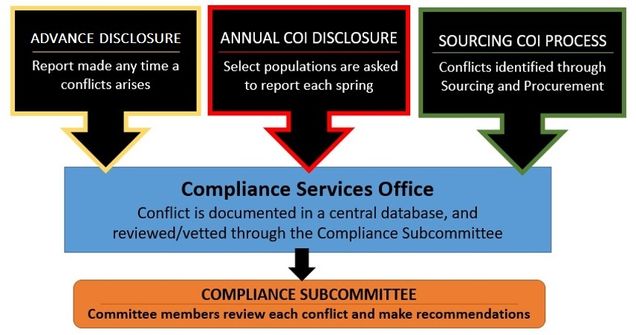Conflict of Interest Processes at BU
Boston University has several different policies and procedures governing conflicts of interest and any reporting requirements that flow from those conflicts. The distinct processes are overseen by various offices around the University.
Conflict of Interest Policies, Processes, and Oversight Offices Explained in a Chart
A chart has been developed to assist in determining if someone has a conflict, how to report that conflict to the appropriate office, and who they should reach out to for any guidance and assistance on next steps.
Questions about Conflicts of Interest
For general conflict of interest questions, please reach out to the Compliance Services Office. Even if Compliance Services does not manage your particular conflict, we can help direct your inquiry to the appropriate office.
Compliance Services Office (CSO) Role with Conflicts of Interest
The Compliance Services Office (“CSO”) oversees compliance with the Boston University Conflict of Interest Policy (COI), which mandates that all Boston University trustees, officers, employees, and other representatives fully disclose individual interests that might conflict with the best interests of the University. The COI Policy is an extension of the University’s Code of Ethical Conduct, which sets forth the standards and procedures to be followed when dealing with situations that may present a conflict of interest.
There are three ways BU employees report conflicts to the Compliance Services Office (CSO) for review by the Compliance Subcommittee.
- Advance Disclosure: Any time a conflict arises, individuals to whom the policy applies are required to independently disclose that conflict to the CSO using a Conflict of Interest Disclosure Form appended to the Policy. For some individuals, this occurs at time of hire. For others, it occurs after a Sourcing and Procurement Conflict is approved, and the individual is asked to fill out a form. When reports are made to the CSO, the conflict is logged and documented with the office.
- Annual Disclosure: Each year, Boston University asks Trustees (including Overseers and Trustees Emeriti), senior administrators, and selected faculty and staff to disclose financial, family, or organizational conflicts as defined by the University’s Conflict of Interest Policy . Boston University’s Information Services & Technology group maintains an online portal and database (“COI Portal”) that serves as the reporting tool and repository of this information. When reports are made to the CSO, the conflict is logged and documented with the CSO.
For more information about the Annual Conflict of Interest process facilitated by the CSO, refer to our Frequently Asked Questions webpage. - Sourcing COI Process: The Sourcing and Procurement Office (S&PO) receives notice of conflicts and potential conflicts in two ways: (1) through vendor self-reporting when they register in the SP&O registration system as required of all first-time vendors; or (2) through an office, department, or employee contact who notifies SP&O of a conflict requiring review. Sourcing conflicts are vetted through the Compliance Subcommittee after review by CSO and coordination with the department, school, or college making the purchase.
Types of Conflicts – more information
Although a detailed Chart is maintained on the Policies website to explain the various types of conflicts and conflict processes at Boston University, below is some additional information on specific types of conflicts.
Faculty Consulting Relationships
In general, faculty consulting relationships are a Faculty External Professional Activity that require disclosure, and sometimes advance approval, in accordance with the Faculty Handbook Conflict of Commitment Policy to the Dean of the appropriate school or college, and in certain cases, the Associate Provost for Research. Individual schools maintain oversight over these consulting relationships.
Medical Campus faculty may have additional reporting obligations pursuant to research activities for your campus within the Boston Medical Center and Boston University Medical Campus Human Research Protection Program Policies and Procedures handbook, including 6.5 Investigator and Research Staff Conflict of Interest Policy and 6.6 Principal Investigator Responsibilities when Conducting Research. There is also the BMC Conflict of Interest Policy that might apply to the consulting relationship.
Note that faculty consulting relationships could fall under the general Conflict of Interest Policy in certain circumstances. The Policy addresses business relationships between the University and faculty or staff, or companies that do business with BU in which faculty or staff (or their families) have a financial interest. Example: BU begins to do business with a company that employs a BU faculty member as a consultant. This example creates a financial conflict under the Conflict of Interest Policy, which would require additional reporting to the Compliance Services Office. The form for reporting such conflicts is included in the Policy as a separate link.
The Office of the General Counsel has additional guidance on the Personal Consulting of Faculty on their website.
Research Conflicts
Financial conflicts of interest (FCOI) in research may occur when outside financial interests compromise, or have the appearance of compromising, the professional judgment of a researcher when designing, conducting, or reporting research. FCOIs are not inherently bad and do not always lead to biased behavior. For more information, refer to the Research Compliance website or email coi@bu.edu.
The related policies are below:
-
- Boston University Investigator Financial Conflicts of Interest Policy for Research
- BU DOE Interim COI Requirements-Addendum to BU FCOI Policy for Research
- BU NASA Revised Requirements-Addendum to BU FCOI Policy for Research
- Boston University Institutional Conflicts of Interest in Research Policy
- Research Financial Conflict of Interest Review Process
- Charles River Campus Institutional Review Board (IRB) Policies and Procedures


